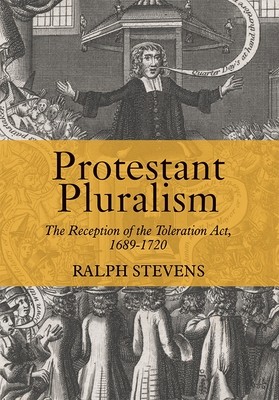
- We will send in 10–14 business days.
- Author: Ralph Stevens
- Publisher: Boydell Press
- ISBN-10: 1783273291
- ISBN-13: 9781783273294
- Format: 15.6 x 23.4 x 1.4 cm, hardcover
- Language: English
- SAVE -10% with code: EXTRA
Reviews
Description
The 1689 Toleration Act marked a profound shift in the English religious landscape. By permitting the public worship of Protestant Dissenters (largely Presbyterian), the statute laid the foundations for legal religious pluralism, albeit limited, and ensured that eighteenth-century English society would be multi-denominational.
The 1689 Toleration Act marked a profound shift in the English religious landscape. By permitting the public worship of Protestant Dissenters, the statute laid the foundations for legal religious pluralism, albeit limited, and ensured that eighteenth-century English society would be multi-denominational. However, the Act was rushed, incomplete and on many issues fundamentally ambiguous. It therefore threw up numerous practical difficulties for the clergy of the Church of England, who were deeply divided about what the legislation implied.This book explores how the Church reacted to the legal establishment of a multi-denominational religious environment and how it came to terms with religious pluralism. Thanks to the Toleration Act's inherent ambiguity, there was genuine confusion over how far it extended. The book examines how the practicalities of toleration and pluralism were worked out in the decades after 1689. A series of five case studies addresses: political participation; the movement for the reformation of manners; baptism; education; and the use of chapels. These studies illustrate how the Toleration Act influencedthe lived experiences of the clergy and the effects that it had on their pastoral role. The book places the Act in its broader context, at the end of England's 'long Reformation', and emphasises how, far from representing a defining constitutional moment, the Act heralded a process of experimentation, debate and adjustment. RALPH STEVENS is a Tutor in History at University College Dublin.
EXTRA 10 % discount with code: EXTRA
The promotion ends in 16d.08:29:39
The discount code is valid when purchasing from 10 €. Discounts do not stack.
- Author: Ralph Stevens
- Publisher: Boydell Press
- ISBN-10: 1783273291
- ISBN-13: 9781783273294
- Format: 15.6 x 23.4 x 1.4 cm, hardcover
- Language: English English
The 1689 Toleration Act marked a profound shift in the English religious landscape. By permitting the public worship of Protestant Dissenters (largely Presbyterian), the statute laid the foundations for legal religious pluralism, albeit limited, and ensured that eighteenth-century English society would be multi-denominational.
The 1689 Toleration Act marked a profound shift in the English religious landscape. By permitting the public worship of Protestant Dissenters, the statute laid the foundations for legal religious pluralism, albeit limited, and ensured that eighteenth-century English society would be multi-denominational. However, the Act was rushed, incomplete and on many issues fundamentally ambiguous. It therefore threw up numerous practical difficulties for the clergy of the Church of England, who were deeply divided about what the legislation implied.This book explores how the Church reacted to the legal establishment of a multi-denominational religious environment and how it came to terms with religious pluralism. Thanks to the Toleration Act's inherent ambiguity, there was genuine confusion over how far it extended. The book examines how the practicalities of toleration and pluralism were worked out in the decades after 1689. A series of five case studies addresses: political participation; the movement for the reformation of manners; baptism; education; and the use of chapels. These studies illustrate how the Toleration Act influencedthe lived experiences of the clergy and the effects that it had on their pastoral role. The book places the Act in its broader context, at the end of England's 'long Reformation', and emphasises how, far from representing a defining constitutional moment, the Act heralded a process of experimentation, debate and adjustment. RALPH STEVENS is a Tutor in History at University College Dublin.


Reviews